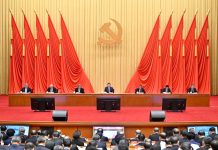BEIJING: China’s private sector promotion law took effect on Tuesday, marking a milestone in the development of the country’s private sector and a landmark event in building a socialist market economy, an official from China’s top economic planner said on Tuesday.
Speaking at a press conference on Tuesday, Li Chao, spokesperson for the National Development and Reform Commission (NDRC), said the NDRC will promote the law’s implementation through three main actions: launching nationwide publicity campaigns; accelerating the implementation of supporting policy measures; and working with relevant departments and local governments to address private enterprises’ concerns.
Li noted that in terms of supporting policies, the NDRC and relevant departments have outlined 53 specific measures across seven key areas. Many of these policies have already been introduced, such as guidelines on improving the social credit system and actions to eliminate market access barriers. Going forward, the NDRC will establish a detailed tracking mechanism to ensure each measure is implemented effectively. To address private firms’ concerns, the NDRC will make use of newly added local government special bonds, strengthen penalties for dishonest behaviors, accelerate the clearing of overdue payments, and improve long-term oversight of enterprise-related charges to enhance transparency, according to Li. China’s top legislative body passed the private sector promotion law on April 30, establishing a legal backing for the steady and healthy growth of the vast sector, including more than 57 million private firms and over 100 million self-employed individuals, Xinhua reported.
The law constitutes China’s first fundamental law dedicated to promoting the private sector. Comprising 78 articles in nine chapters, the law covers such areas as fair competition, investment and financing promotion, scientific and technological innovation, regulatory guidance, service support, rights and interests protection and legal liabilities, according to the report.
Tian Xuan, a deputy to the National People’s Congress and president of the National Institute of Financial Research at Tsinghua University, told the Global Times that the law serves as a long-awaited confidence booster for private businesses, turning national support into legal commitment. “It marks a new stage in China’s economic governance – one of institutional upgrading built on the foundation of rule of law,” he said.
As China moves into a critical stage of high-quality development, private firms are being counted on to drive breakthroughs in core technologies and lead emerging industries, according to Tian. “The implementation of the law injects fresh momentum into this engine – removing barriers to resource flows and enabling private firms to pursue new growth in areas like the digital economy and green transition,” he said.
Tian added that against the backdrop of sweeping global shifts and intensifying international competition, the focus has shifted from market share in individual products to entire industrial chains and innovation ecosystems. “With their agility and innovative capacity, private firms are at the forefront of transforming ‘Made in China’ into ‘Created in China’ and play a vital role in global value chain restructuring,” Tian said.
“By equipping private enterprises with legal safeguards and strong policy support, the law enhances their ability to operate to global standards, maintain long-term resilience, and anchor China’s economic stability amid external uncertainty,” he said.
Qi Xiangdong, vice chairman of the All-China Federation of Industry and Commerce and chairman of Qi-Anxin Group, told the Global Times that the Private SectorPromotion Law directly addresses the core concerns of private enterprises, particularly in critical areas such as technological innovation and financing.
“In high-stakes sectors like cybersecurity – where R&D is both costly and long-term – stable cash flow is vital not only for business survival but also for safeguarding national infrastructure. The law provides institutional support to ease funding pressure and accelerate the transformation of core technologies, strengthening both artificial intelligence (AI) development and digital security,” Qi said. –The Daily Mail-Global Times news exchange item






